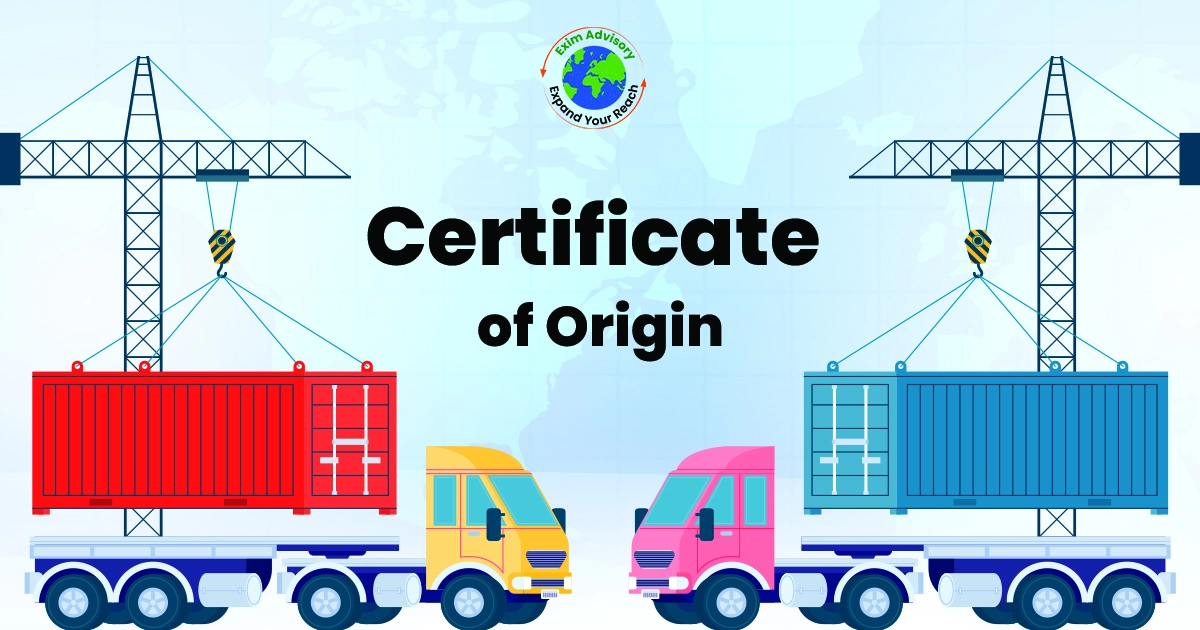The customs law contains various provisions, providing either the exemption from import duties or a levy of a higher amount of duty. Two of the most important criteria here are the goods involved as well as the place from which the goods are imported. While the tax on the former is based on demand and supply and entirely in the hands of the government, there is a scope of manipulation in the case of the latter i.e., the place from where the goods are imported or exported. That’s why the certificate of origin becomes important.
What is Certificate of Origin for Export?
The certificate of origin shows the country of origin of the goods imported or exported. Country of origin is basically the place where the goods were actually manufactured or produced. There are different determinants for establishing the country of origin of goods. Apart from the country of origin, the certificate of origin also contains other information such as the product details, destination and country of export. It is one of the important instruments in international trade.
Who Issues DGFT Certificate or Origin?
The certificate of origin is issued by the Trade Promotion Council of India as well as the Indian Chamber of Commerce. The certificate of origin for export being issued is crucial for the exporters in India to prove that the commodities being exported are actually of Indian origin. Further, it also proves that the exported commodity is wholly produced or manufactured in India.
The certificate of origin should be signed by the exporter along with a permanent indemnity bond executed on a non-judicial stamp paper of Rs. 10, duly notarized. Further, it should also be signed and stamped by the above authorities like the Chamber of Commerce etc.
Importance of (COO)Certificate of Origin
The importance of certificate of origin cannot be undermined in the course of international trade, especially for customs clearance. If the goods being imported or exported are not supported by the certificate of origin, the customs officer won’t allow the clearance of goods. The certificate is crucial to determine the correct rate of duty applicable on the goods and whether the import/export is not illegal.
Types of Certificates of Origin for Export
Following are the different types of certificates of origin that the Chambers of Commerce can issue:
- Non-Preferential Certificate of Origin: The non-preferential certificate of origin states that the goods being imported or exported do not enjoy any preferential tariff treatment and therefore, applicable duties should be levied on the goods being imported or exported.
- Preferential Certificate of Origin: The preferential certificate of origin is issued for the import or export of goods that are subject to preferential tariff rates. This can either be a concession in the duties applicable or a complete exemption of the duties. The exemption can be due to the policies of the government or the trade agreements being entered into between two or more nations.
How to Obtain Certificate of Origin India?
The process and authority from which certificate of origin shall be obtained depends upon the type of certificate of origin that you wish to obtain. In order to apply for certificate of origin, you need to submit the following documents:
- Cover letter for the issue of certificate of origin
- Details of the product that is being exported
- The packing list for the concerned invoice in duplicate
- A copy of the invoice. It shall contain the following information, ‘We hereby declare that the goods mentioned in this invoice are of Indian origin and manufacture’
- 9 copies of duly completed certificate of origin
- Payment of the requisite amount of fees applicable
In a Nutshell
A certificate of origin India is important, without which you cannot proceed with your import/export transaction. It not only helps determine the true country of origin of the goods but is also crucial for customs clearance as well as levy of the correct rate of duty. In case you are also willing to apply for certificate of origin, feel free to contact Exim Advisory.
Also, Check "Transfer Pricing Service"
